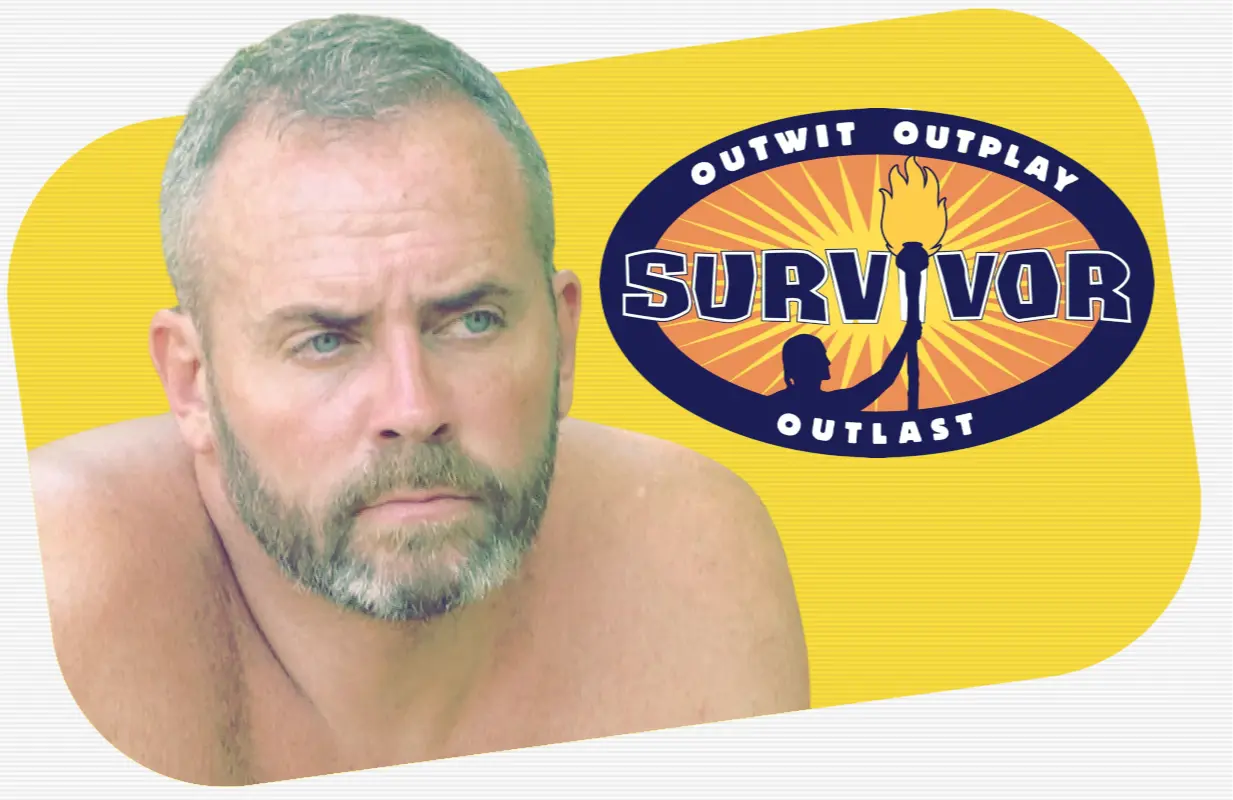Richard Hatch Pushed Boundaries to Define Reality TV Villainy
-
 Survivor's Richard Hatch (Photo: Everett Collection; Primetimer graphic)
Survivor's Richard Hatch (Photo: Everett Collection; Primetimer graphic)The collective gasp heard on August 23, 2000 was 51 million people learning that Survivor’s first jury just awarded the game’s first villain $1 million. One of the people who’d cast the deciding vote in Richard Hatch’s favor, Sue Hawk, had just called him “an arrogant, pompous, human being,” and in another of the Survivor finale’s iconic moments, referred to him to as a snake “who knowingly went after prey.”
Richard Hatch’s journey to that million dollars — and to becoming competition reality TV’s first villain, a snake willing to eat whatever was in its path — began the first day of Survivor: Borneo. After the tribe reached their beach, exhausted from actually paddling in, he perched himself on a tree branch, sitting physically and metaphorically above everyone else, and watching the other seven players’ cross-talk about building a shelter.
“You guys. I think the first thing we ought to do is talk about how we’re going to do whatever we’re going to do. Talk about the process,” he said. They ignored him and walked away, but at their own peril.
“I think we’re off to a bad start,” he told Sue. “Nobody’s working toward a particular goal — not the silly little stuff about oh, who’s going to sleep where, what are we going to do, but why are we here? What’s the point?” After this conversation, Rich looked into a camera and said, “I’ve got the million-dollar check written already. I’m the winner.”
His confidence was ultimately validated, of course. But back then, on Day 1, it seemed silly, ridiculous even. No American had played a televised game like this before, living on a beach and trying to outwit other players. Before anyone else had considered the long game, or strategy, Richard was already thinking ahead.
Richard knew the game before there was a game, helping to define it, though in ways that chafed against our sense of right and wrong about interactions with other people. “Outright lying is absolutely essential,” Richard says in the ninth episode, and while 2023 reality TV competitors might agree, that was not a given in 2000.
Americans may have been familiar with bluffing in poker, but transposing the game to an island and survival setting changed everything, making the lies and deceit so much more personal. Watching players navigate this new game — and watching Richard think strategically while another player casts votes based on whose name is next alphabetically — is part of why the first season still holds up.
Hatch’s reputation, not so much: Since Borneo, Richard Hatch’s standing as a Survivor player sank, and not just because he went to prison for tax evasion. In Survivor: All-Stars, Hatch competed in a challenge naked, and rubbed against Sue Hawk during a challenge. She later quit the game, saying, “I was sexually violated.”
Before that, before prison, three years earlier in Borneo, Richard Hatch was also self-aware enough to realize that he would, in fact, be seen as villainous. “It’s that kind of cocky attitude that makes people really hate your guts, so that’s the kind of thing I’ve really got to keep under wraps,” he said after declaring the prize was his.
Richard was not successful doing that, either to his fellow players or to viewers watching at home. His willingness to play a cutthroat game, culminating in abandoning his ally Rudy during the final endurance immunity challenge, is why his win over Kelly — the rat in Sue’s speech — seemed like such a shock. Kelly took Rich to the final two, convinced his reputation would secure her the win. How could the other players reward such behavior?
In retrospect, though, Richard’s villainy is almost quaint. It’s certainly more arrogance than evil, at a time when American broadcast TV audiences had not yet been introduced to Simon Cowell. Hatch is given credit for being a master strategist, and for inventing the alliance, but the very first coalition of votes does not involve him, and he doesn’t even vote with anyone else at his first Tribal Council. He’s also almost voted off in a post-merge episode.
What Richard did, however, was unapologetically play the game, helping to define a new kind of public interaction, one in which the parameters of the game allowed for dishonest and manipulative behavior. Reality TV shows and players are still testing those boundaries, for themselves and for those watching, but Richard was the first player to push against them.
Andy Dehnart is a writer, TV critic, and teacher who reviews and reports about reality TV at reality blurred.
TOPICS: Richard Hatch, Survivor